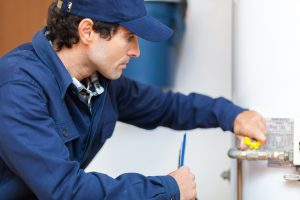Handling the Frequently Encountered Water Heater Emergencies
Handling the Frequently Encountered Water Heater Emergencies
Blog Article
Here in the next paragraph you will find lots of good details with regards to Is Your Water Heater Leaking?.

A hot water heater is one of one of the most essential fundamental appliances that can be located in a home. With water heaters, you do not need to go through the anxiety of heating water manually every single time there is a demand to wash, do the laundry, or the recipes. There is constantly a possibility that your water heating unit would act up as with a lot of mechanical tools.
It is very important to keep in mind any kind of little malfunction and tackle it rapidly before points leave hand. The majority of times, your hot water heater starts to malfunction when there is an accumulation of debris as a result of continual usage. As a preventative measure, routine flushing of your water heater is advised to avoid debris accumulation and prevent functional failing.
Typical water heater emergency situations as well as exactly how to take care of them
Insufficient hot water
Dealing with an insufficient supply of hot water can be irritating. It might be that the water heater can't sustain the warm water need for your apartment or condo. To deal with this problem, you might try to adjust your heating unit's temperature dial and wait on a few mins. You can ask for the assistance of a professional plumber if the trouble continues. You can upgrade your water heating unit to one with a bigger capacity.
Changing water temperature level.
Your water heating system might start producing water of different temperatures usually ice scalding or chilly hot. There may be a requirement to change either the heating or the thermostat system of your water heater.
Leaking hot water heater container.
A leaking container could be an indicator of corrosion. It can cause damages to the flooring, wall and electrical tools around it. You might also go to danger of having your home swamped. In this circumstance, you must shut off your hot water heater, allow it to cool down, and very carefully search for the source of the issue. At times, all you need to do is to tighten a few screws or pipe connections in cases of minor leakages. If this does not work and the leakage persists, you may require to use the services of a professional for an appropriate replacement.
Stained or odiferous water
When this takes place, you need to recognize if the issue is from the tank or the water resource. If there is no amusing scent when you run cool water, after that you are particular that it is your water heating system that is malfunctioning. The odiferous water can be created by rust or the accumulation of bacteria or sediments in the water heater container.
Verdict
Some house owners overlook little caution and also minor faults in their hot water heater device. This just causes additional damages and also a feasible total failure of your appliance. You must handle your hot water heater mistakes as soon as they come near stay clear of even more costs and also unneeded emergency problems.
With water heating units, you don't need to go via the anxiety of heating water manually every time there is a need to take a bath, do the laundry, or the recipes. It may be that the water heating unit can't sustain the hot water need for your house. Your water heating system can start creating water of different temperature levels generally ice hot or cold warm. If there is no amusing scent when you run cold water, then you are particular that it is your water heating system that is defective. The stinky water can be created by rust or the accumulation of bacteria or debris in the water heating system storage tank.
Common Water Heater Issues and What You Should Do
What Type of Water Heater Do You Have?
Before we begin it’s first important that you identify the type of water heater you have on your property. There are two main types of water heaters out there: conventional and high efficiency.
Both of these types of products typically use either gas or electricity to heat power. There are also solar water heaters that use a thermal collector on the roof or yard to heat the water.
While these models are not as common, they can cut heating costs in half. In this article, we will focus on conventional and high efficiency.
How Do My Electric and Gas Water Heater Work?
Though they look similar, electric and gas water heaters work very differently. It’s important to know their basic function because often problems can be specific to the heating source.
In the electric model, a thermostat on the side of the machine detects the temperature of the water in the tank. When the temperature needs to rise electricity flows to a heating element suspended in the water.
Gas models also use a thermostat device — typically with a mercury sensor at the tip and an additional sensor called a thermocouple. The thermocouple detects whether the pilot light is on and controls the flow of gas.
When the thermostat drops below the appropriate level gas is released which becomes ignited by the pilot light. The flame heats the bottom of the water tank which causes hot water to rise and cold water to drop.
This natural circulation continues until the water reaches the desired temperature. Then, the thermostat triggers the gas control valve to shut off the flow of gas.
What Are the Most Common Issues and How Do You Fix Them?
https://happyhiller.com/blog/common-water-heater-issues-and-what-you-should-do/

Hopefully you liked our topic about Is Your Water Heater Leaking?. Thanks a lot for finding the time to browse our post. Appreciated our piece of writing? Please share it. Help another person locate it. Thank-you for going through it.
Book Instantly Report this page